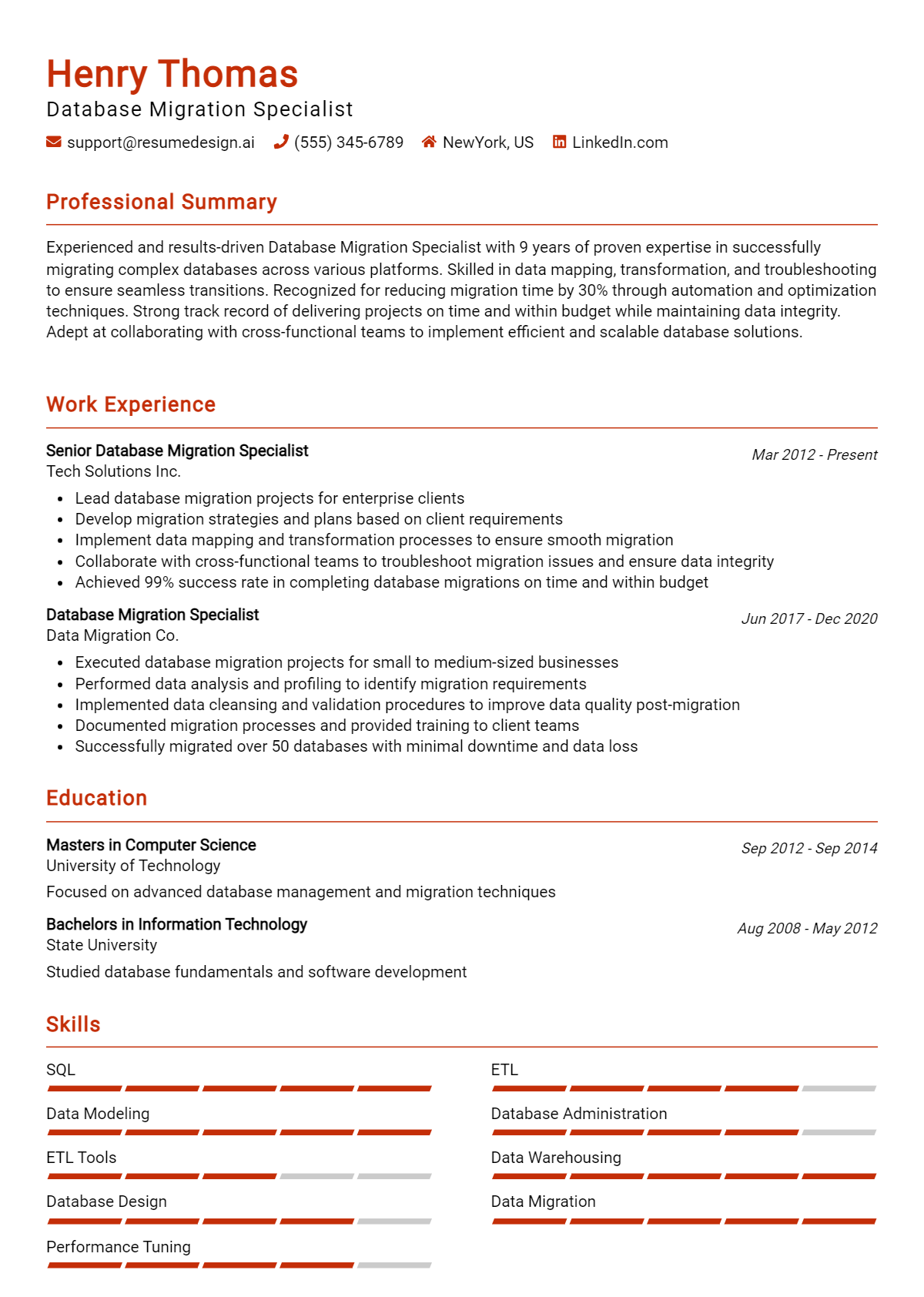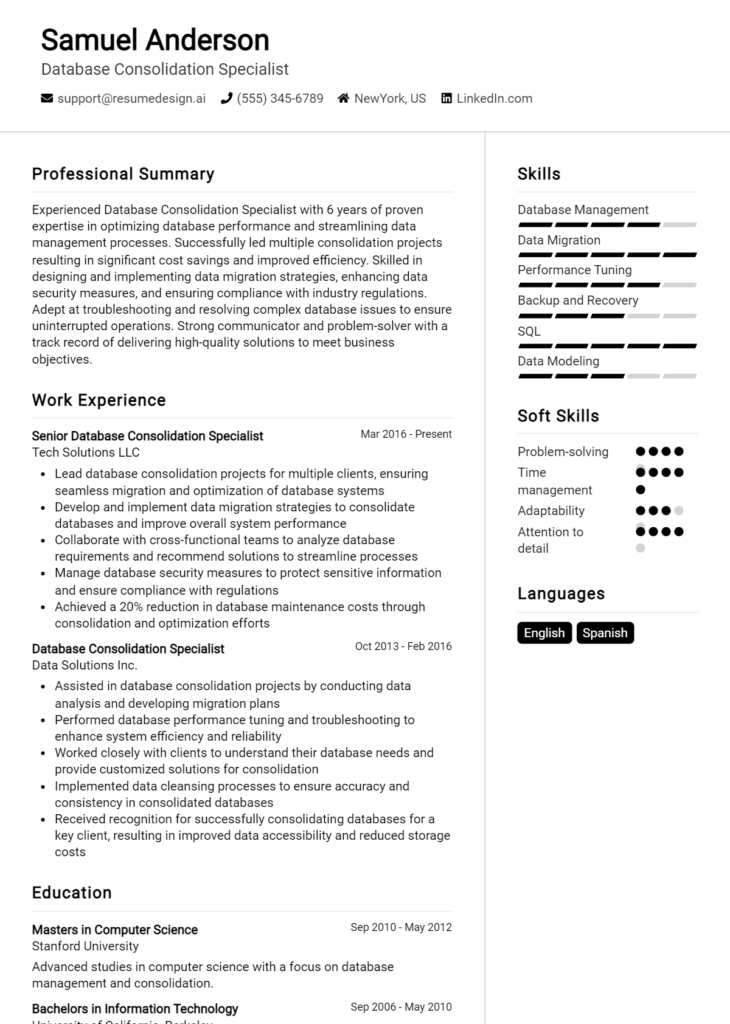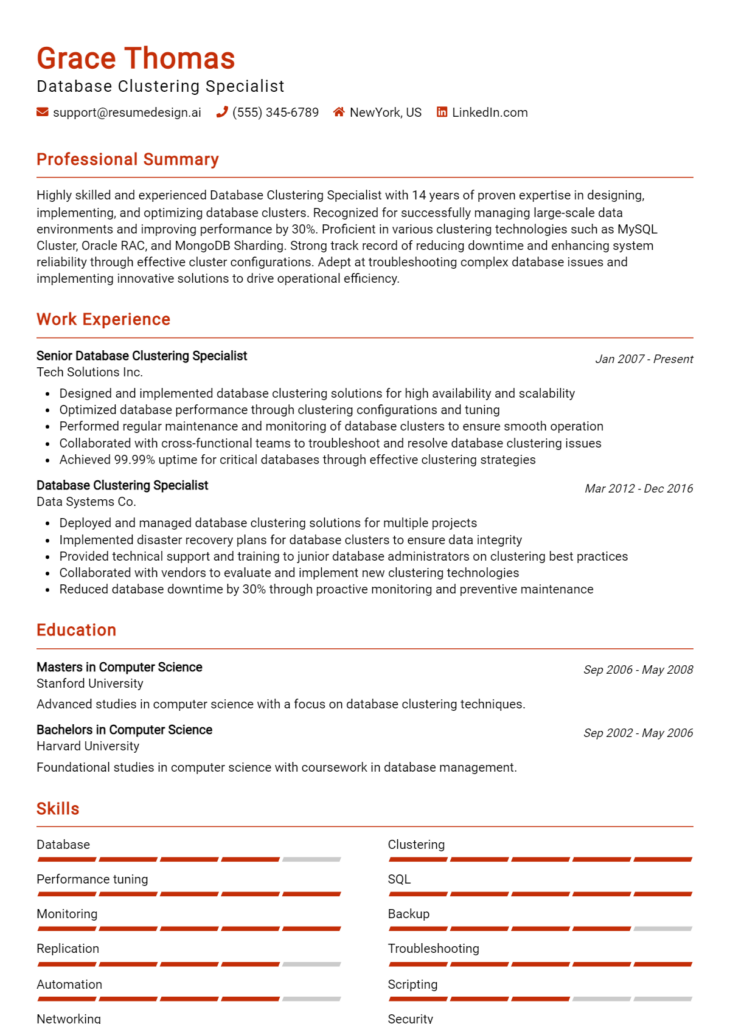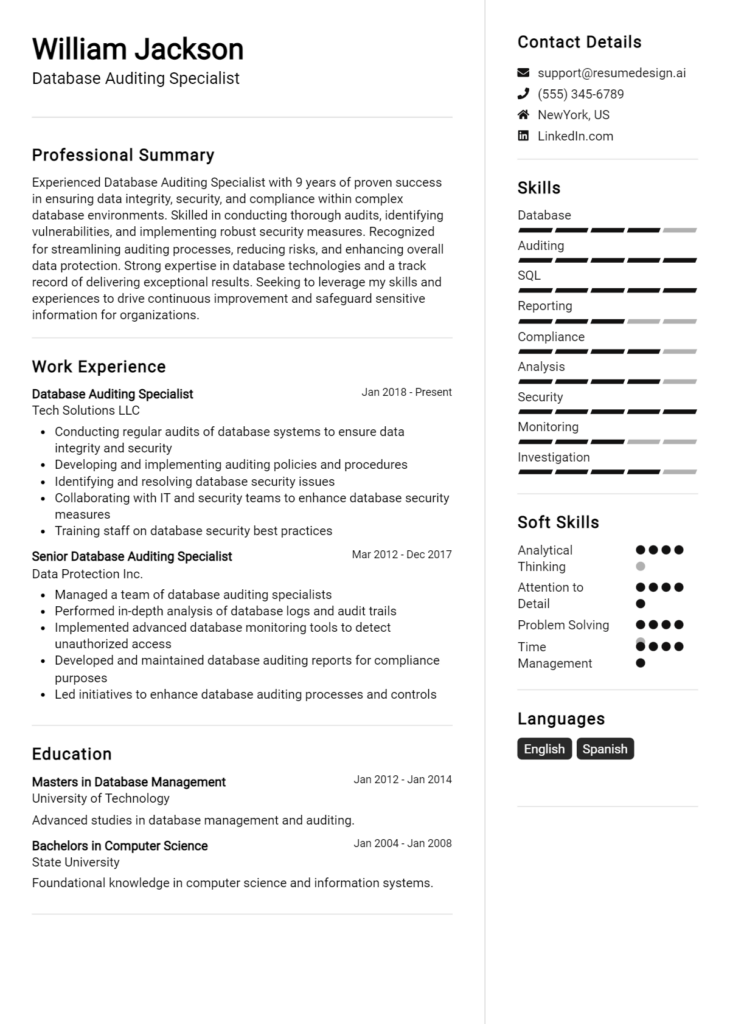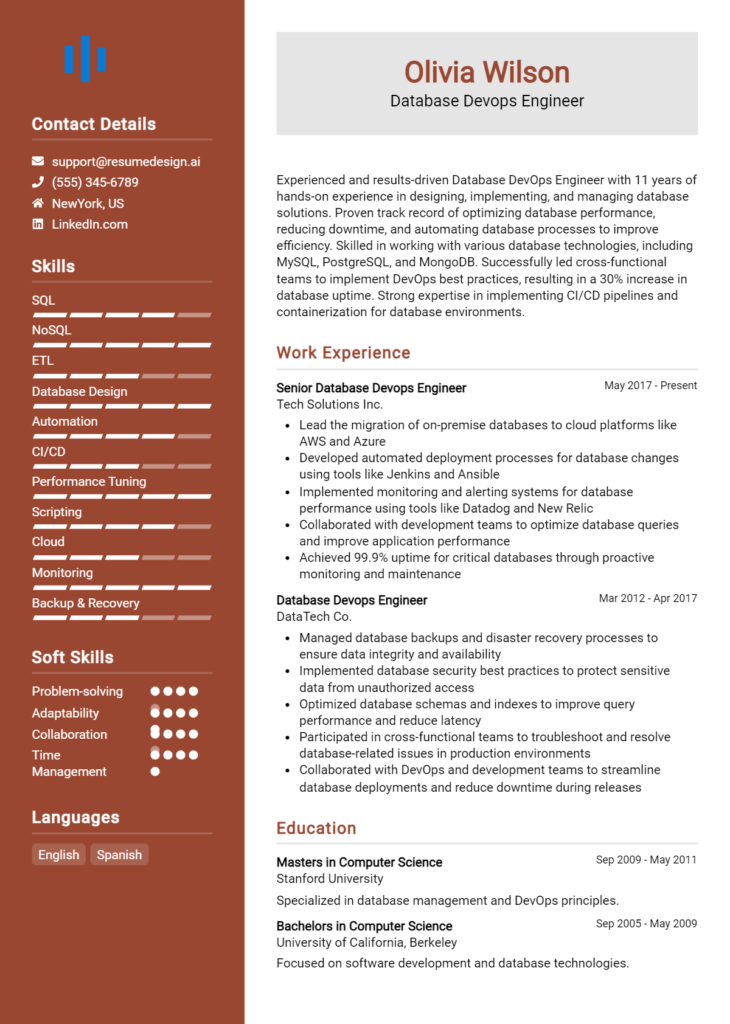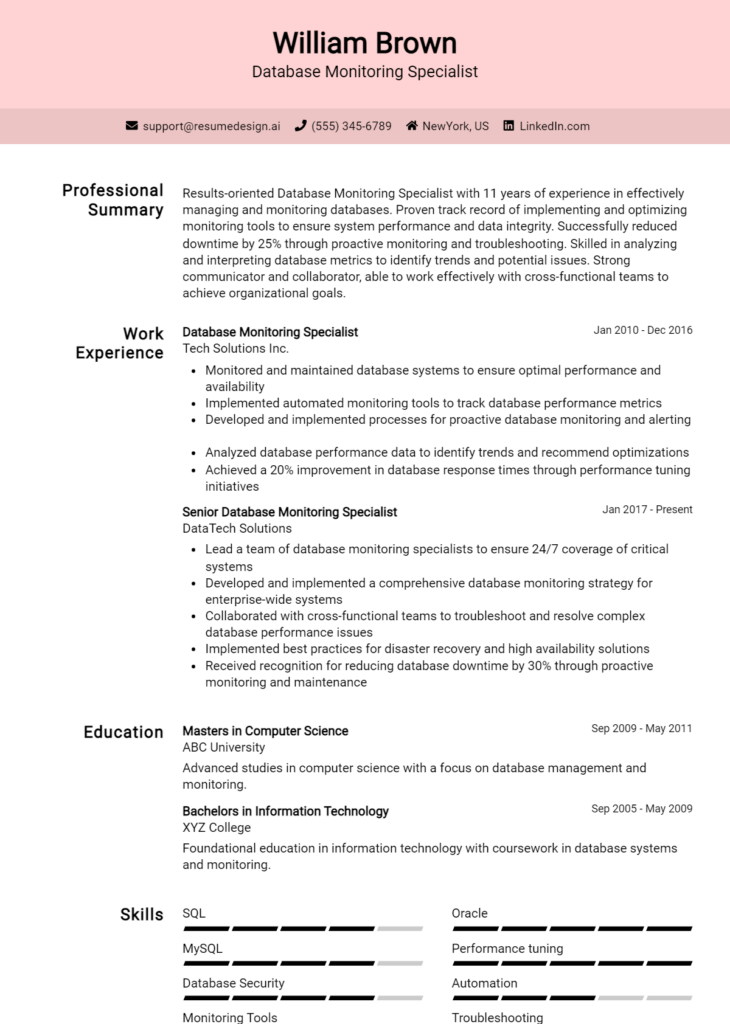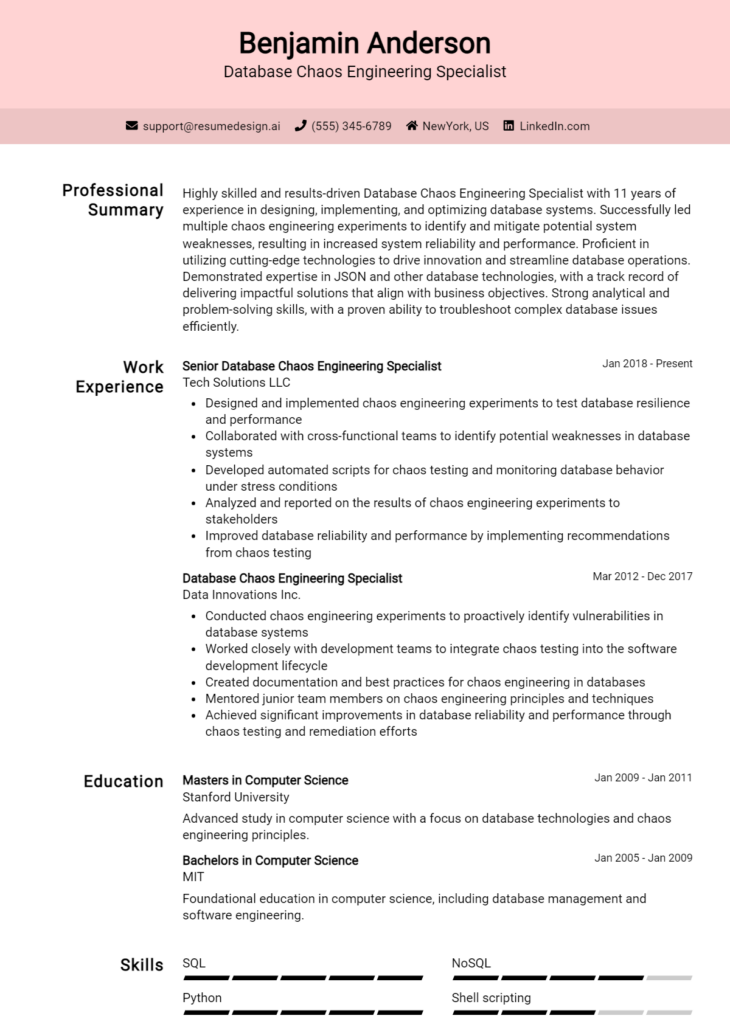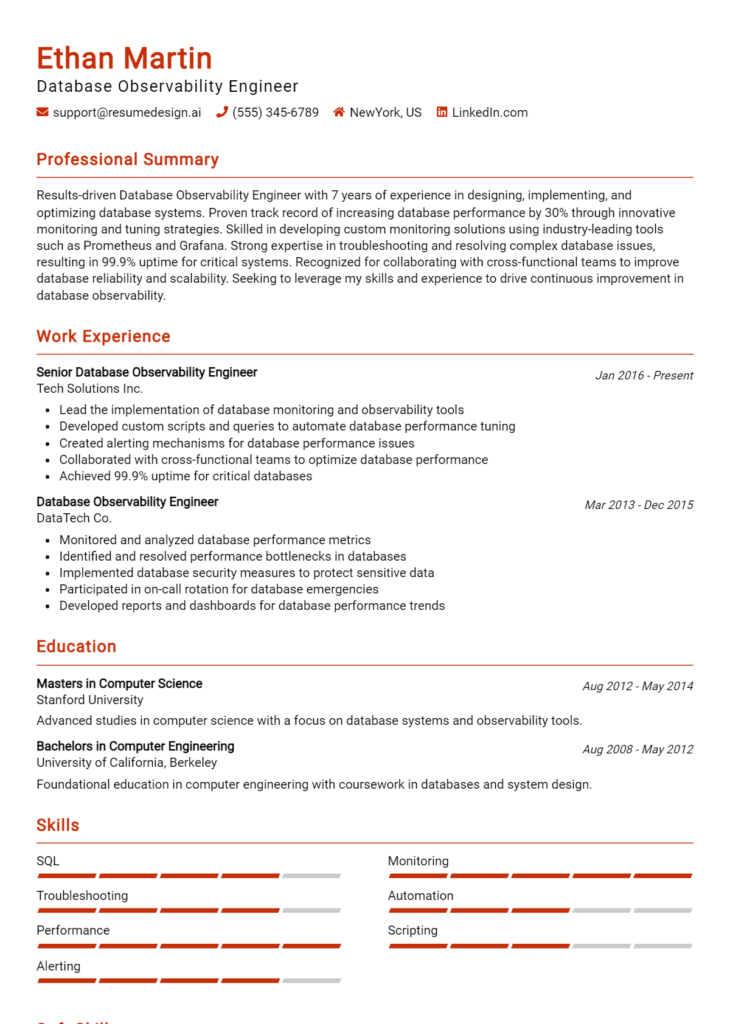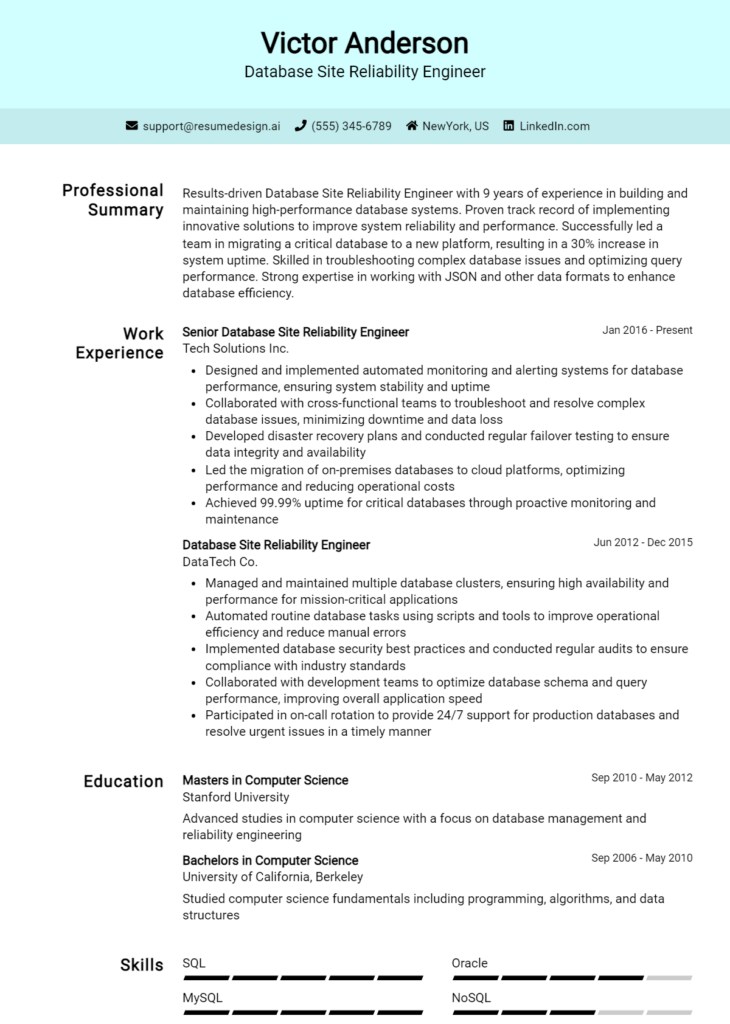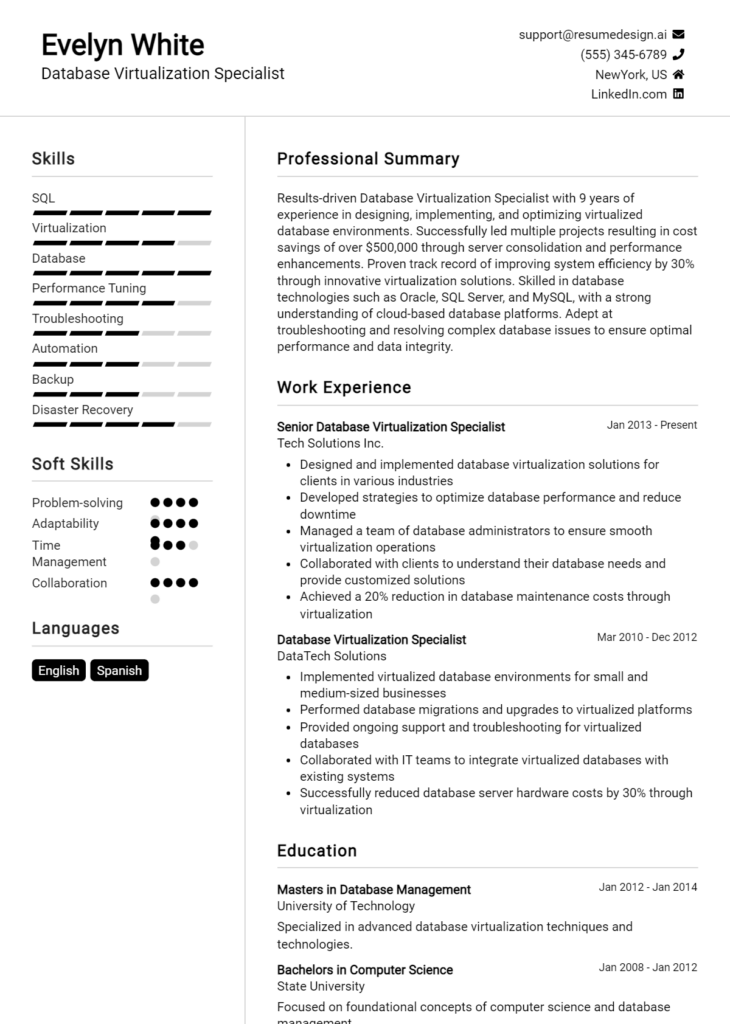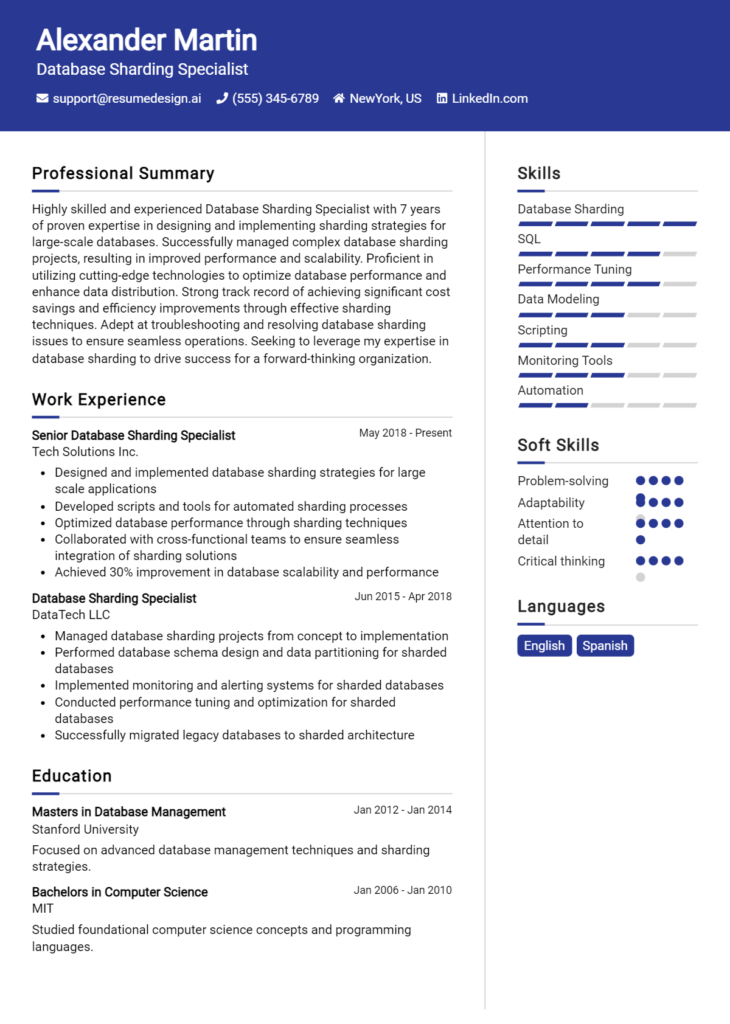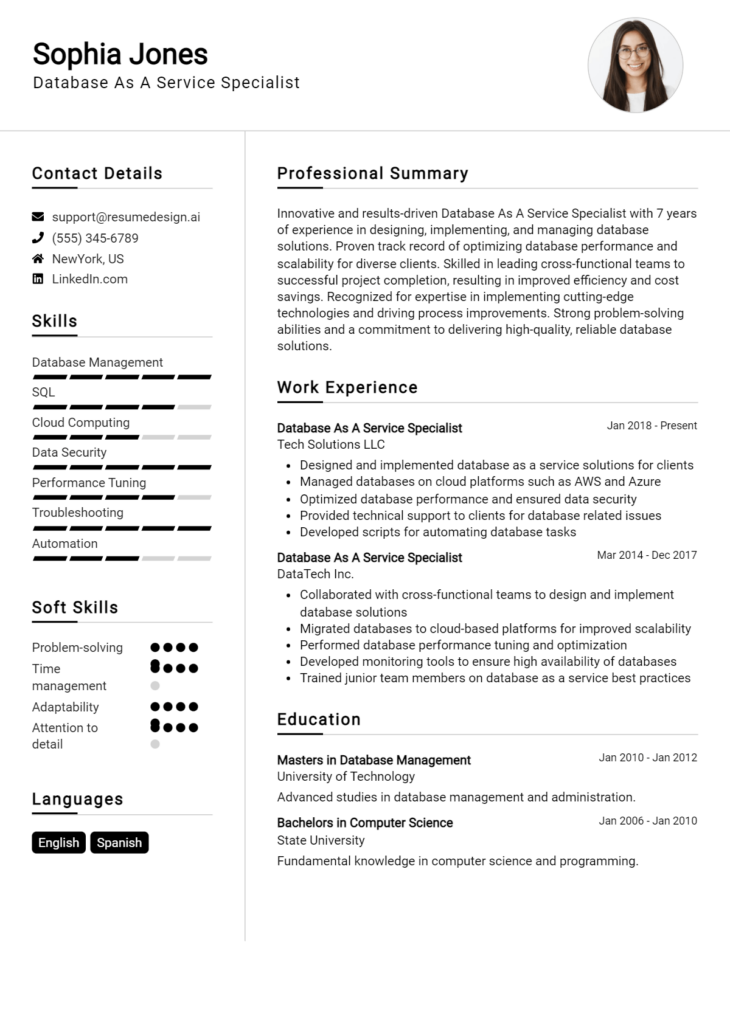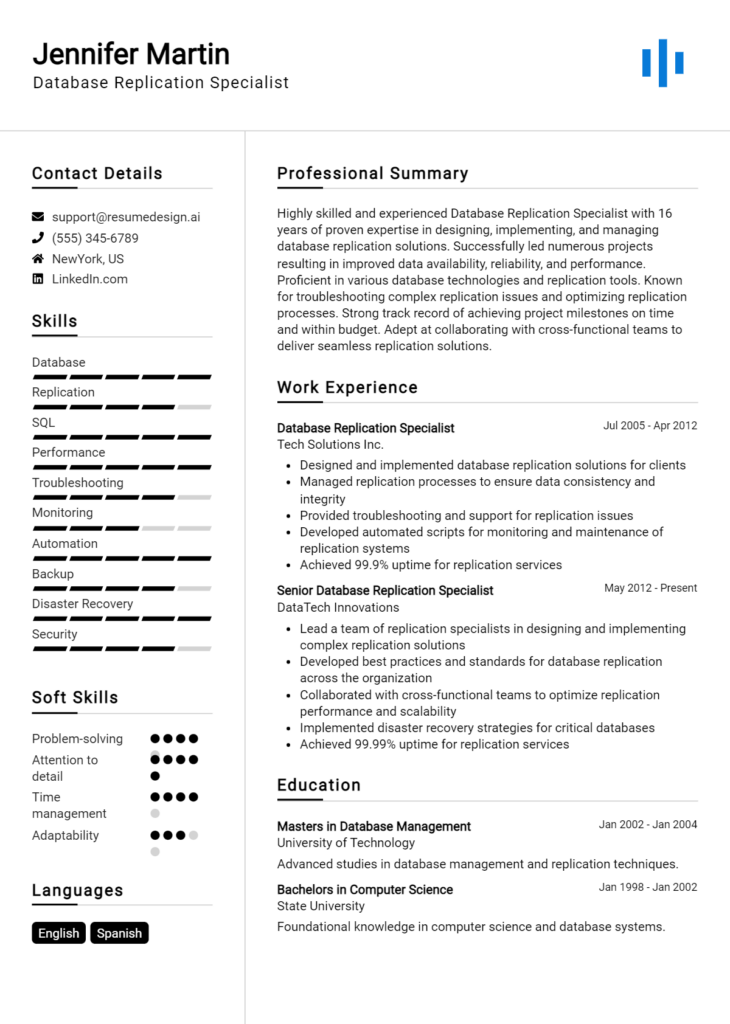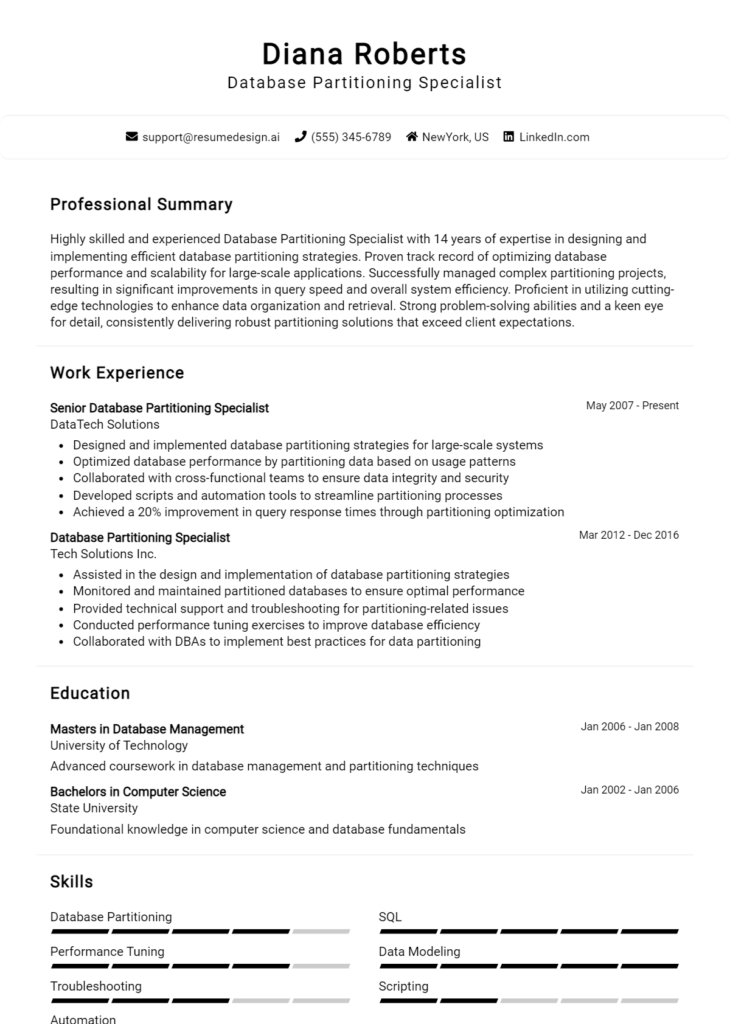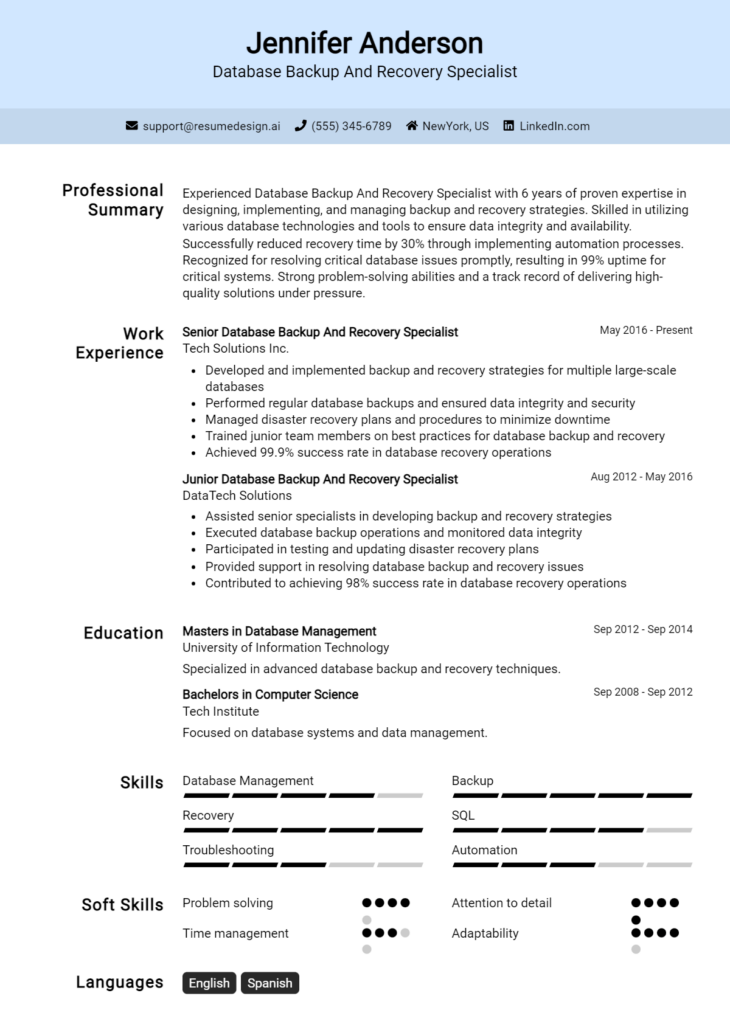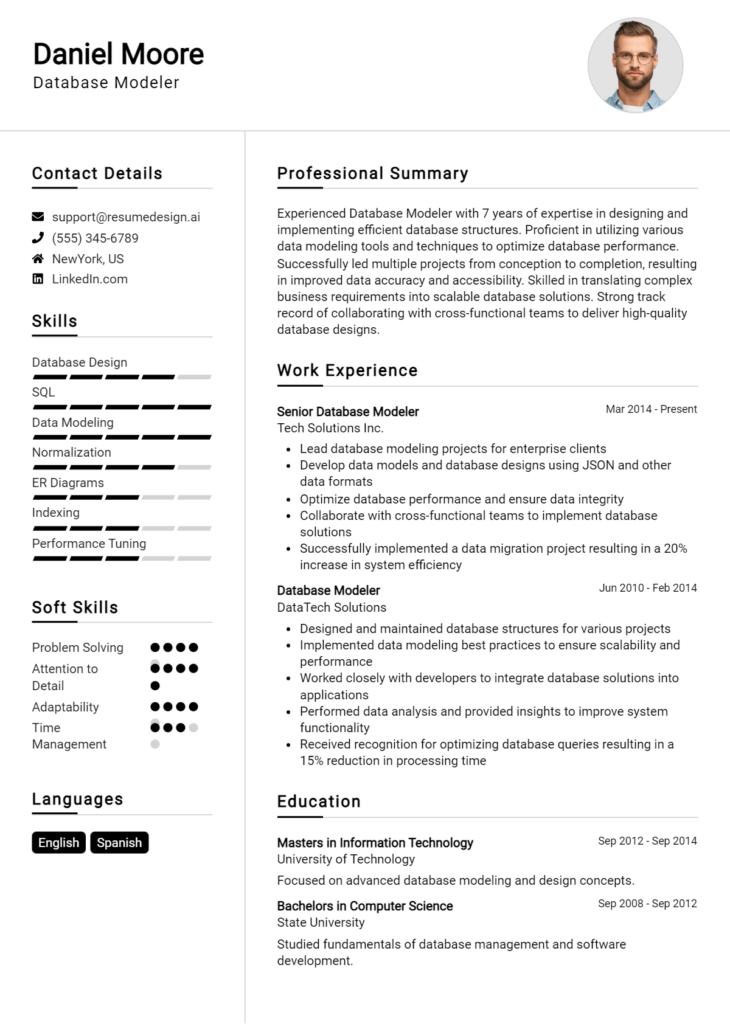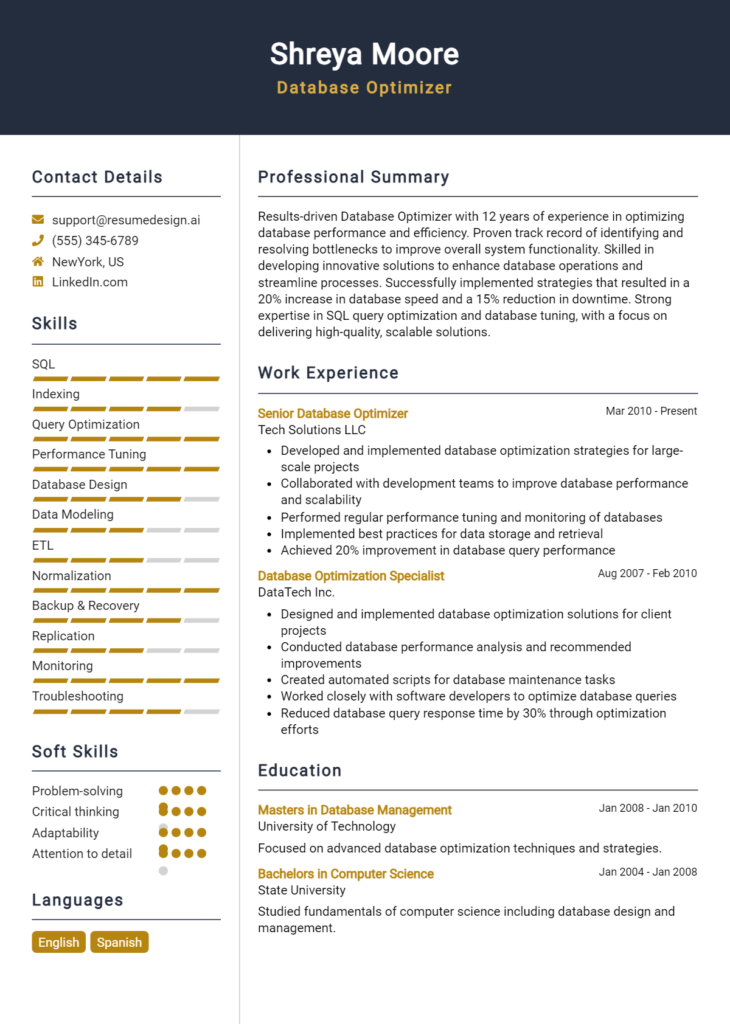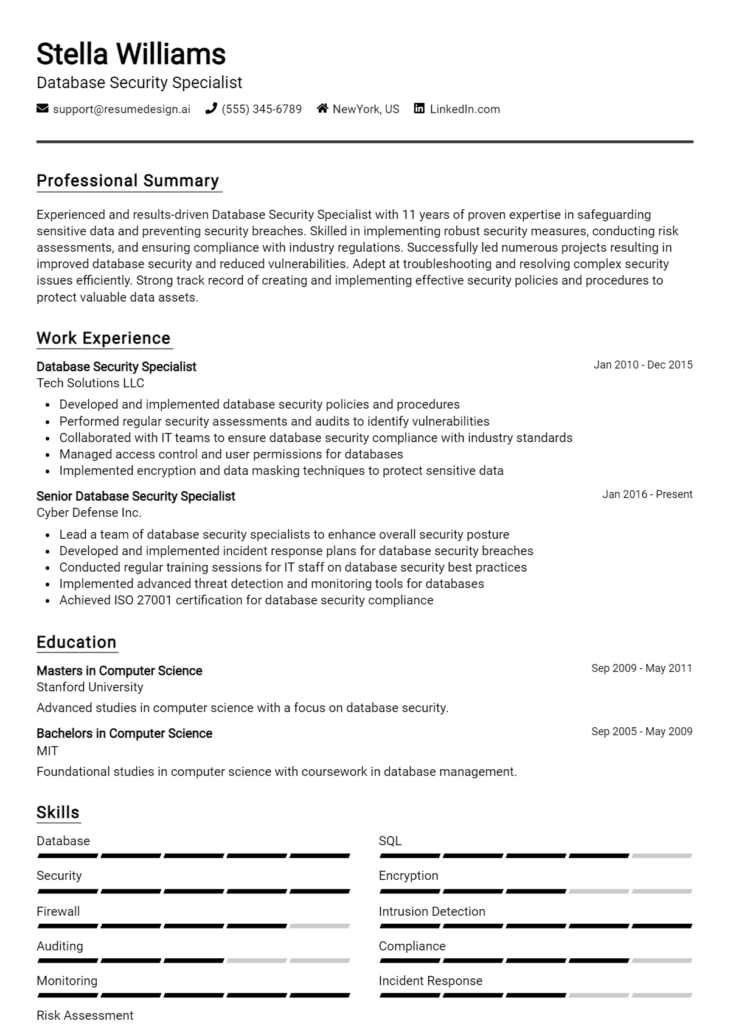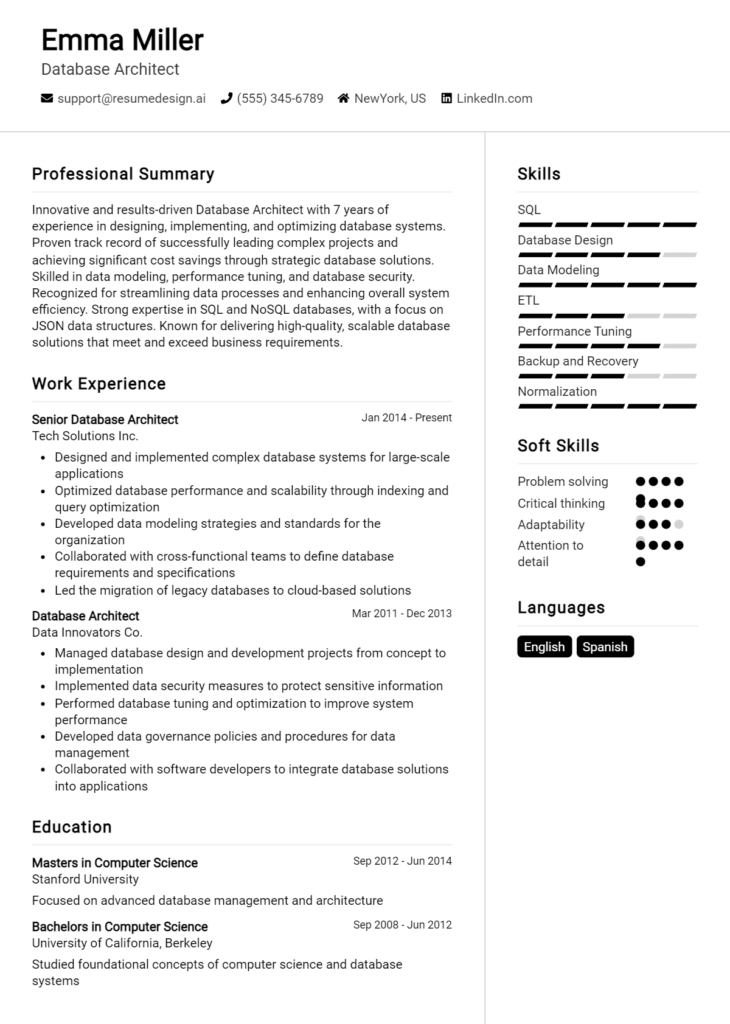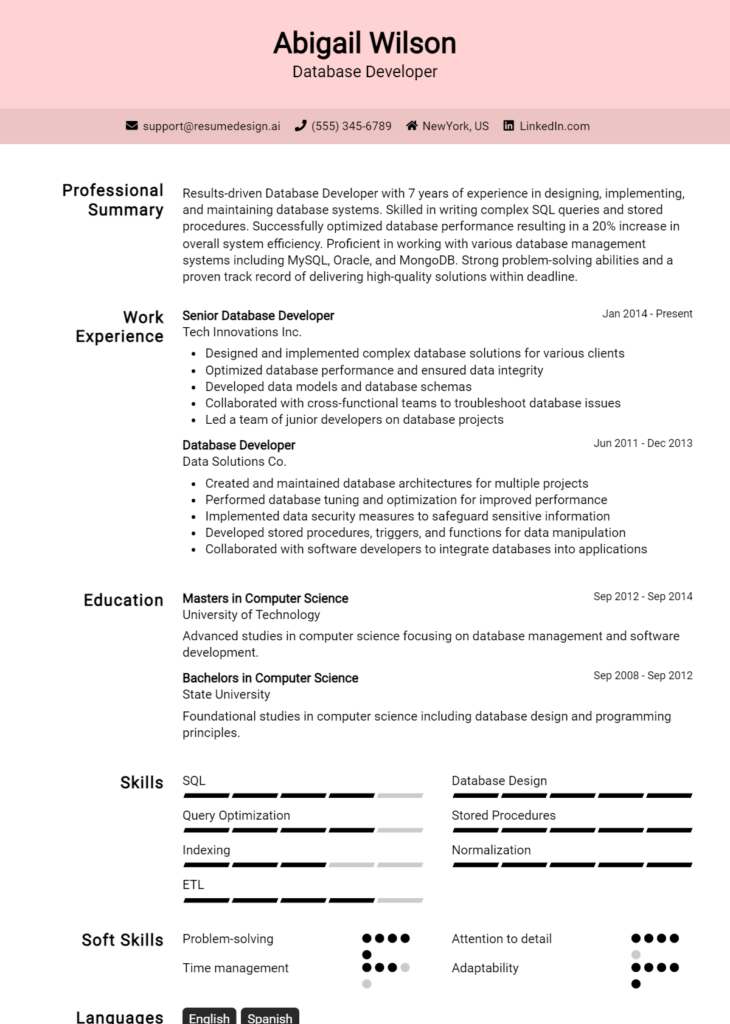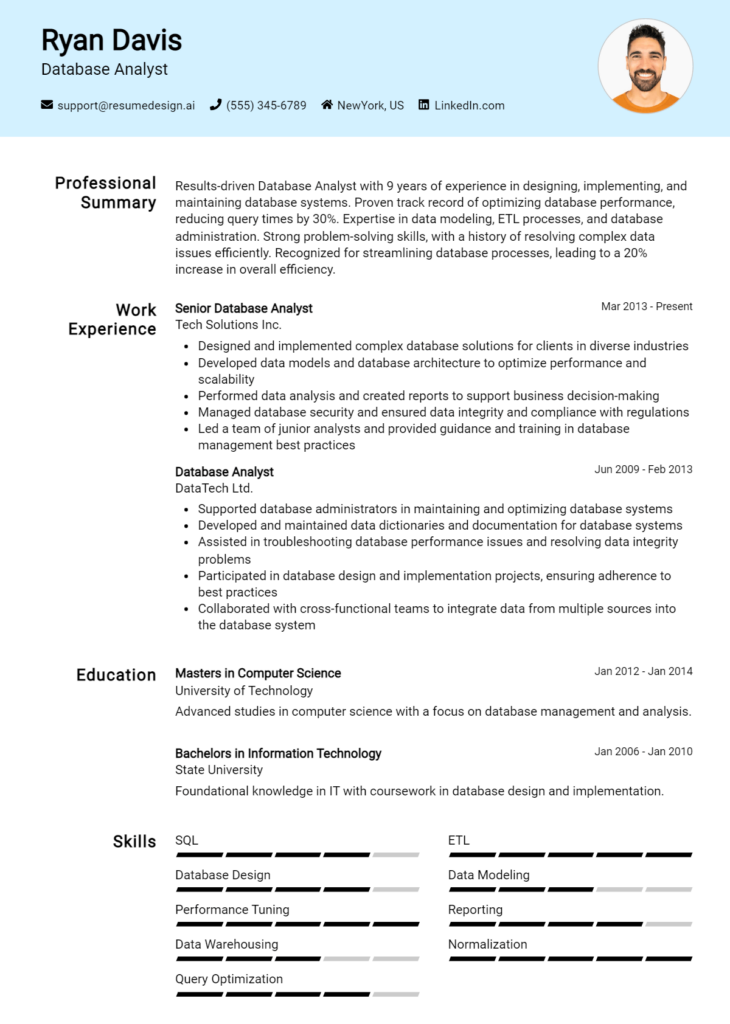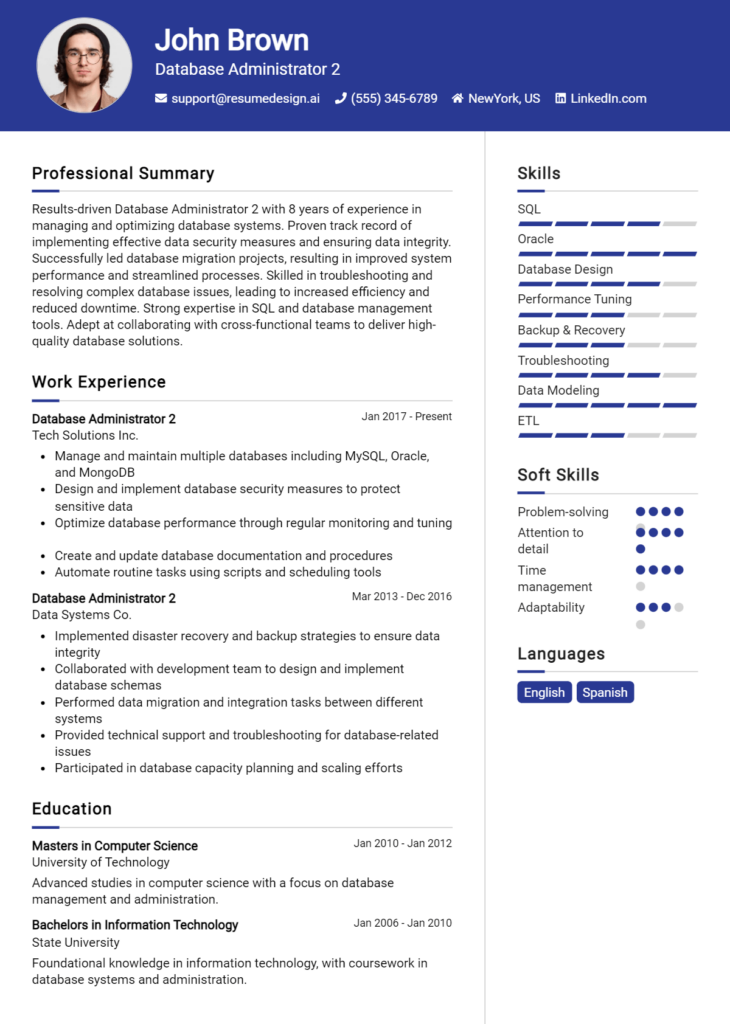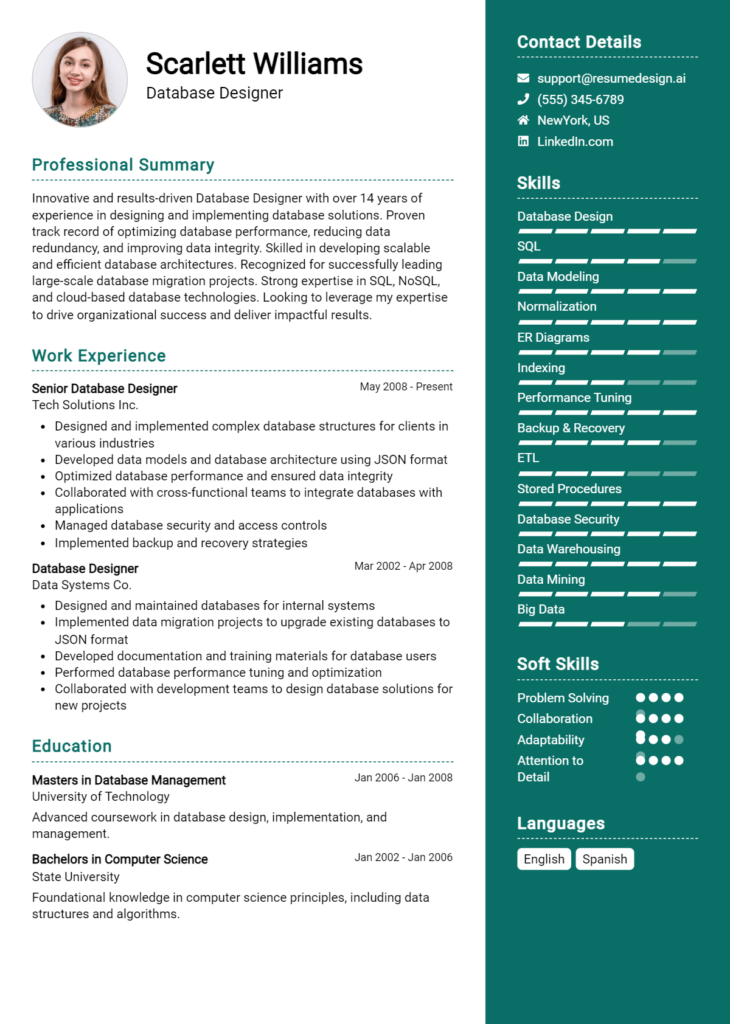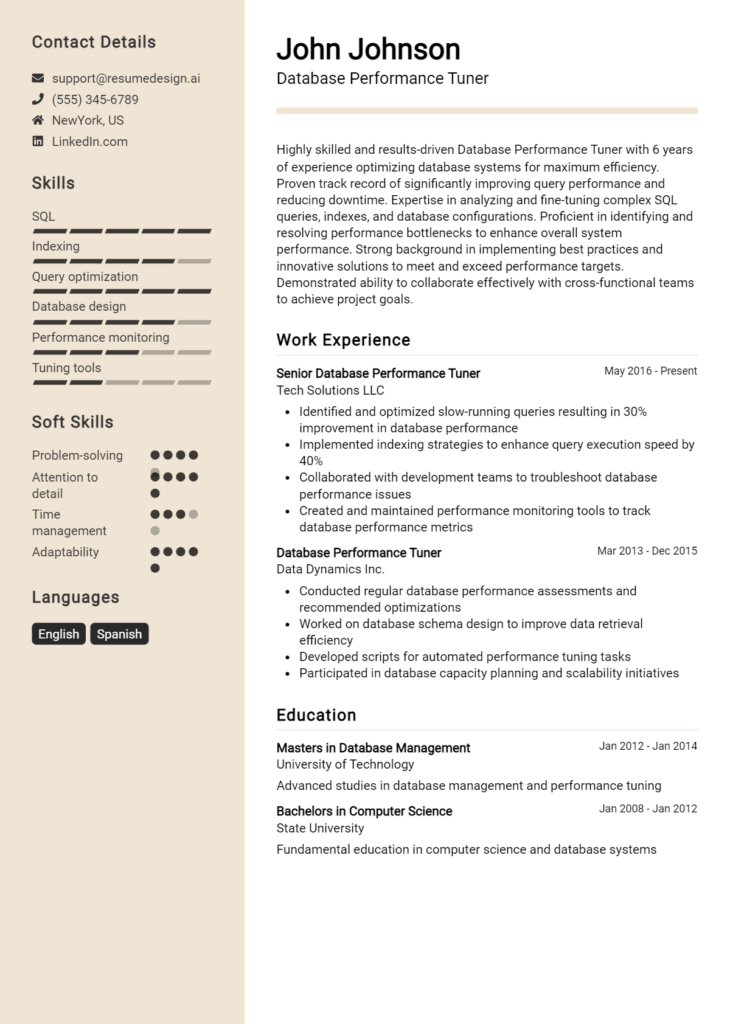Database Migration Specialist Core Responsibilities
A Database Migration Specialist plays a crucial role in transitioning data between systems, ensuring seamless integration across departments. This position demands strong technical skills in database management, operational understanding of business processes, and exceptional problem-solving abilities to address migration challenges. By effectively bridging IT and business functions, the specialist contributes to the organization's strategic goals. A well-structured resume that highlights these competencies can significantly enhance a candidate's prospects in this competitive field.
Common Responsibilities Listed on Database Migration Specialist Resume
- Assessing and analyzing existing database structures for migration readiness.
- Developing migration strategies and plans tailored to specific project requirements.
- Executing data migration processes while ensuring data integrity and accuracy.
- Collaborating with cross-functional teams to align migration efforts with business objectives.
- Performing post-migration testing and validation to confirm successful data transfer.
- Troubleshooting migration-related issues and implementing effective solutions.
- Documenting migration processes and maintaining detailed records of changes.
- Providing training and support to end-users on new database systems.
- Staying updated on industry trends and emerging technologies for database management.
- Ensuring compliance with data governance and security policies throughout the migration.
- Reporting on migration progress and outcomes to stakeholders.
High-Level Resume Tips for Database Migration Specialist Professionals
In the competitive field of database migration, a well-crafted resume serves as a crucial tool in showcasing your qualifications to potential employers. As a Database Migration Specialist, your resume is often the first impression you make, and it needs to effectively reflect not only your technical skills but also your achievements in the field. A strong resume can distinguish you from other candidates, highlighting your expertise in managing complex data transitions and ensuring minimal disruption in business operations. This guide will provide practical and actionable resume tips specifically tailored for Database Migration Specialist professionals, ensuring that your resume stands out in a crowded job market.
Top Resume Tips for Database Migration Specialist Professionals
- Tailor your resume to match the job description by incorporating relevant keywords and phrases.
- Showcase your relevant experience with specific examples of successful database migrations you have managed.
- Quantify your achievements by including metrics, such as the percentage of downtime minimized or the speed of data transfer improvements.
- Highlight industry-specific skills, such as expertise in various database management systems (DBMS) like Oracle, SQL Server, or MySQL.
- Include certifications relevant to database migration, such as AWS Certified Database Specialty or Microsoft Certified: Azure Database Administrator Associate.
- Demonstrate your problem-solving skills by mentioning specific challenges faced during migrations and how you overcame them.
- Utilize a clear and concise format that emphasizes readability, ensuring that key information stands out.
- Incorporate soft skills such as teamwork, communication, and project management, which are crucial for successful migrations.
- Keep your resume updated with the latest trends and technologies in database management and migration.
By implementing these tips, you can significantly enhance your chances of landing a job in the Database Migration Specialist field. A well-structured resume that clearly presents your skills and accomplishments will not only capture the attention of hiring managers but also increase your confidence as you navigate the job search process. Stand out as a top candidate by showcasing your expertise and readiness to tackle the challenges of database migration.
Why Resume Headlines & Titles are Important for Database Migration Specialist
In the competitive landscape of database migration, the role of a Database Migration Specialist is crucial for ensuring seamless transitions of data from one system to another. A well-crafted resume headline or title serves as the first impression a potential employer receives, making it essential for candidates to capture the attention of hiring managers instantly. A strong headline concisely summarizes a candidate's key qualifications, skills, and experience in a single impactful phrase, providing a snapshot of what they bring to the table. When tailored specifically to the job being applied for, these headlines can significantly enhance a resume's effectiveness, setting the stage for further evaluation.
Best Practices for Crafting Resume Headlines for Database Migration Specialist
- Keep it concise: Aim for a headline that is direct and to the point, ideally no longer than 10-12 words.
- Be role-specific: Clearly indicate your expertise in database migration to attract the right opportunities.
- Highlight key skills: Incorporate relevant skills that showcase your qualifications in database management and migration.
- Use action words: Begin with strong action verbs to convey your proactive approach and results-oriented mindset.
- Include relevant experience: Mention years of experience or significant projects to establish credibility.
- Tailor for each application: Customize your headline to align with the specific job description and requirements.
- Avoid jargon: Use clear and straightforward language that is easily understood by hiring managers.
- Focus on outcomes: If possible, hint at measurable results or successes to demonstrate your impact in previous roles.
Example Resume Headlines for Database Migration Specialist
Strong Resume Headlines
Expert Database Migration Specialist with 7+ Years of Experience in Cloud Transitions
Results-Driven Database Migration Expert Specializing in SQL and NoSQL Technologies
Database Migration Specialist: Successfully Led 10+ Large-Scale Migrations with Zero Downtime
Proficient Database Migration Consultant with Proven Track Record in Data Integrity and Security
Weak Resume Headlines
Experienced IT Professional
Database Specialist Looking for Opportunities
The strong headlines are effective because they are specific, highlight relevant experience, and communicate a clear value proposition to potential employers. They immediately convey the candidate's expertise in database migration, making it easy for hiring managers to see their qualifications. On the other hand, the weak headlines fail to impress due to their vagueness and lack of specificity. They do not provide any insight into the candidate's skills or achievements, making it difficult for hiring managers to gauge their potential fit for the role.
Writing an Exceptional Database Migration Specialist Resume Summary
A well-crafted resume summary is essential for a Database Migration Specialist as it serves as the first impression for hiring managers. This concise paragraph provides a snapshot of the candidate's key skills, relevant experience, and significant accomplishments, quickly capturing attention and setting the tone for the rest of the resume. An impactful summary not only showcases the candidate's qualifications but also reflects their understanding of the specific demands of the role they are applying for, making it a critical component in the competitive job market.
Best Practices for Writing a Database Migration Specialist Resume Summary
- Quantify achievements: Use specific numbers to highlight your impact, such as the percentage of successful migrations or the size of databases managed.
- Focus on skills: Emphasize technical skills related to database management, migration tools, and methodologies.
- Tailor the summary: Customize your summary for each job application to align with the job description and specific requirements.
- Highlight relevant experience: Include years of experience in database management and any specialized areas such as cloud migrations.
- Showcase problem-solving abilities: Mention any challenges faced in previous migrations and how you successfully overcame them.
- Use industry-specific keywords: Incorporate terms that are relevant to database migration to pass through applicant tracking systems.
- Keep it concise: Aim for 3-5 sentences that are impactful and to the point.
Example Database Migration Specialist Resume Summaries
Strong Resume Summaries
Results-driven Database Migration Specialist with over 8 years of experience in executing seamless data migrations for enterprise-level clients. Successfully migrated over 500 TB of data to cloud environments, achieving a 99.9% data integrity rate. Proficient in SQL, Oracle, and AWS services, with a proven ability to lead cross-functional teams to meet tight deadlines.
Detail-oriented Database Migration Specialist with a solid track record of improving database performance by 40% post-migration. Skilled in using ETL tools and database design, with hands-on experience in migrating legacy systems to modern platforms. Adept at troubleshooting and optimizing data workflows to enhance overall operational efficiency.
Dynamic Database Migration Specialist with 5 years of experience in planning and executing migrations for large-scale businesses. Recognized for reducing migration downtime by 30% through careful project management and risk assessment. Expertise in data mapping, validation, and post-migration support, ensuring a smooth transition for all stakeholders.
Weak Resume Summaries
Experienced database specialist with knowledge of migration processes. Looking for a new opportunity to utilize skills in a challenging work environment.
Database Migration Specialist with a background in IT. I have worked on various projects and am eager to contribute to your team.
The examples of strong resume summaries stand out because they are specific, measurable, and directly related to the responsibilities of a Database Migration Specialist. They highlight quantifiable achievements, relevant skills, and demonstrate a clear understanding of the job role. In contrast, the weak summaries are vague and lack detail, making it difficult for hiring managers to gauge the candidates' qualifications or potential contributions to the organization. Strong summaries effectively communicate the candidate's value, while weak ones fail to make an impact.
Work Experience Section for Database Migration Specialist Resume
The work experience section of a Database Migration Specialist resume is critical as it serves as a detailed showcase of the candidate's technical skills, project management capabilities, and their ability to deliver high-quality database solutions. This section not only highlights specific technical proficiencies, such as familiarity with various database platforms and migration tools, but also demonstrates the candidate's experience in leading teams and collaborating across departments. Quantifying achievements, such as successful migrations completed or performance improvements realized, is essential to convey the impact of their work. Aligning this experience with industry standards helps potential employers understand the candidate's relevance in today's data-driven landscape.
Best Practices for Database Migration Specialist Work Experience
- Utilize action verbs to begin each bullet point, showcasing proactive involvement.
- Quantify achievements whenever possible, using metrics to demonstrate success.
- Highlight relevant technologies and tools used during migrations.
- Detail specific roles played in team projects to illustrate collaboration.
- Include challenges faced during migrations and how they were overcome.
- Tailor the experience to align with the job description for the position applied for.
- Showcase continuous learning and adaptation to new database technologies.
- Provide examples of improving process efficiency or reducing downtime during migrations.
Example Work Experiences for Database Migration Specialist
Strong Experiences
- Led a team of 5 in a successful migration of over 1 million records from Oracle to AWS, resulting in a 30% reduction in query response time.
- Implemented a new automated migration strategy that decreased downtime by 40%, significantly improving client satisfaction during transitions.
- Collaborated with cross-functional teams to develop a standardized migration procedure, reducing overall project time by 25% and ensuring consistency across deployments.
- Trained junior team members on data integrity checks and best practices, enhancing team efficiency and reducing post-migration errors by 50%.
Weak Experiences
- Assisted with database migrations and did some troubleshooting.
- Worked on a few projects that involved moving data from one system to another.
- Involved in various database-related tasks as part of the team.
- Helped with some documentation during migrations.
The examples labeled as strong showcase specific achievements, quantifiable outcomes, and effective collaboration, reflecting the candidate's impact on their projects and the organizations they worked with. In contrast, the weak experiences lack specificity and measurable results, making them less impressive and failing to convey the candidate's true capabilities in database migration. Strong experiences paint a picture of a proactive and results-oriented professional, while weak experiences come off as vague and uninspiring.
Education and Certifications Section for Database Migration Specialist Resume
The education and certifications section of a Database Migration Specialist resume is crucial as it showcases the candidate's academic background, relevant skills, and commitment to professional development. This section not only highlights formal degrees and industry-recognized certifications but also emphasizes ongoing learning initiatives that align with the rapidly evolving database technology landscape. By including relevant coursework, specialized training, and certifications, candidates can significantly enhance their credibility and demonstrate their preparedness for the responsibilities associated with the Database Migration Specialist role.
Best Practices for Database Migration Specialist Education and Certifications
- Prioritize relevant degrees, such as Computer Science, Information Technology, or Database Management.
- Include industry-recognized certifications like Microsoft Certified: Azure Database Administrator Associate or AWS Certified Database Specialty.
- Highlight specialized training in database migration tools and techniques, such as Oracle Data Migration or SQL Server Migration Assistant.
- Detail relevant coursework that demonstrates knowledge of database architecture, data modeling, and ETL processes.
- Keep the section concise and focused on qualifications that are directly applicable to the Database Migration Specialist role.
- Update the section regularly to include new certifications or courses completed to showcase continuous learning.
- Use clear formatting to make the section easy to read and visually appealing.
- Consider including any participation in relevant workshops, seminars, or conferences to further demonstrate engagement with the field.
Example Education and Certifications for Database Migration Specialist
Strong Examples
- Bachelor of Science in Computer Science, University of Technology, 2022
- Microsoft Certified: Azure Database Administrator Associate, 2023
- Coursework in Database Management Systems, Data Warehousing, and Cloud Computing
- Oracle Certified Professional, MySQL 5.7 Database Administrator, 2022
Weak Examples
- Bachelor of Arts in English Literature, University of Arts, 2019
- Certification in Basic Computer Skills, 2020
- Online course in Creative Writing, 2021
- Diploma in Graphic Design, 2018
The examples listed as strong demonstrate relevant degrees and certifications that directly align with the responsibilities of a Database Migration Specialist, showcasing the candidate's preparedness and expertise in the field. In contrast, the weak examples illustrate educational qualifications that are either outdated, irrelevant, or do not pertain to database management or technology, thereby failing to enhance the candidate's suitability for the role. Focusing on pertinent educational background and certifications is essential for establishing credibility and competence in database migration tasks.
Top Skills & Keywords for Database Migration Specialist Resume
The role of a Database Migration Specialist is crucial in today’s data-driven landscape, where organizations increasingly rely on effective data management and seamless transitions between systems. A well-crafted resume that highlights the right skills can significantly enhance a candidate's appeal to potential employers. Skills not only demonstrate a candidate's technical proficiency but also their ability to adapt to new environments, troubleshoot issues, and collaborate with cross-functional teams. By showcasing both hard and soft skills, a Database Migration Specialist can illustrate their comprehensive expertise in ensuring that data migration processes are executed smoothly and efficiently.
Top Hard & Soft Skills for Database Migration Specialist
Soft Skills
- Attention to Detail: Ensures accuracy during data migration.
- Problem-Solving: Ability to identify and resolve migration issues effectively.
- Communication: Facilitates clear dialogue with technical and non-technical stakeholders.
- Adaptability: Quickly adjusts to changing technologies and methodologies.
- Team Collaboration: Works well with diverse teams to achieve migration objectives.
- Time Management: Prioritizes tasks to meet deadlines.
- Analytical Thinking: Evaluates data and processes for migration planning.
- Customer Service Orientation: Addresses client needs during migrations.
- Project Management: Oversees the migration project from start to finish.
- Critical Thinking: Assesses and improves migration strategies.
Hard Skills
- Database Management Systems (DBMS): Proficiency in platforms like SQL Server, Oracle, and MySQL.
- Data Mapping: Skills in translating data from one format to another.
- ETL Tools: Experience with Extract, Transform, Load (ETL) processes and tools.
- Scripting Languages: Knowledge of languages such as Python, Perl, or Shell scripting.
- Cloud Technologies: Familiarity with AWS, Azure, or Google Cloud for database migration.
- Data Backup and Recovery: Understanding of backup strategies and disaster recovery plans.
- SQL Proficiency: Strong skills in writing and optimizing SQL queries.
- Performance Tuning: Ability to enhance database performance post-migration.
- Data Security: Knowledge of data protection regulations and secure migration practices.
- Version Control Systems: Experience with tools like Git for managing changes in database scripts.
- Data Visualization: Ability to present data migration results using visualization tools.
- Database Design: Understanding of schema design and optimization techniques.
- API Integration: Skills in integrating databases with various applications through APIs.
- Data Quality Assurance: Techniques to ensure data integrity and quality throughout the migration process.
- Documentation: Ability to create and maintain comprehensive migration documentation.
By highlighting these skills in their resumes, Database Migration Specialists can effectively convey their qualifications and readiness for the challenges of the role. Additionally, showcasing relevant work experience can further bolster their candidacy, demonstrating a proven track record in successful data migrations.
Stand Out with a Winning Database Migration Specialist Cover Letter
Dear Hiring Manager,
I am writing to express my interest in the Database Migration Specialist position at [Company Name] as advertised on [where you found the job listing]. With a proven track record of successfully executing complex database migrations and a strong background in database management, I am excited about the opportunity to contribute to your team and ensure seamless data transitions. My expertise in various database platforms, along with my problem-solving skills, makes me a valuable asset for your organization.
In my previous role at [Previous Company Name], I led a team responsible for migrating a large-scale legacy database to a cloud-based solution. This project required meticulous planning, data mapping, and extensive testing to ensure data integrity throughout the migration process. I utilized tools such as SQL Server Integration Services (SSIS) and AWS Database Migration Service, which resulted in a 30% reduction in migration time and significant cost savings for the company. My ability to communicate effectively with cross-functional teams allowed us to address challenges promptly and maintain project timelines.
I am particularly drawn to the opportunity at [Company Name] due to your commitment to leveraging innovative technologies to enhance data management. I am eager to bring my skills in database optimization and performance tuning to help your organization streamline processes and improve operational efficiency. I am confident that my proactive approach and attention to detail will contribute positively to your team.
Thank you for considering my application. I am looking forward to the opportunity to discuss how my experience and passion for database migration can benefit [Company Name]. Please feel free to contact me at [Your Phone Number] or [Your Email Address] to schedule a discussion.
Sincerely,
[Your Name]
Common Mistakes to Avoid in a Database Migration Specialist Resume
Crafting a resume as a Database Migration Specialist can be a daunting task, especially given the technical expertise and attention to detail required for the role. A well-structured resume not only showcases your skills and experience but also helps you stand out to potential employers. However, many candidates fall into common pitfalls that can undermine their chances of landing an interview. Here are several mistakes to avoid when creating your resume:
Lack of Clear Objective: Failing to include a clear career objective can leave employers confused about your intentions and the specific role you are targeting.
Overloading with Technical Jargon: While technical skills are important, excessive jargon can alienate hiring managers who may not be familiar with every term. Aim for clarity and conciseness.
Neglecting Soft Skills: Focusing solely on technical abilities and neglecting soft skills, such as teamwork and communication, can make your resume seem one-dimensional.
Ignoring Results and Impact: Simply listing responsibilities without demonstrating the outcomes of your work can weaken your resume. Use metrics and specific examples to showcase your contributions.
Inconsistent Formatting: A disorganized or inconsistent format can distract from your qualifications. Use a clean, professional layout with consistent font sizes and styles.
Listing Irrelevant Experience: Including unrelated work experience can dilute the impact of your resume. Tailor your content to highlight experiences that are pertinent to database migration.
Failing to Customize for Each Application: Sending out a generic resume without tailoring it to the specific job description can result in missed opportunities. Always adjust your resume to align with the job requirements.
Omitting Keywords: Many companies use Applicant Tracking Systems (ATS) to screen resumes. Failing to incorporate relevant keywords from the job description may result in your resume being overlooked.
Conclusion
As a Database Migration Specialist, you play a crucial role in ensuring that data transitions smoothly from one system to another while maintaining data integrity and minimizing downtime. Throughout this article, we've explored the essential skills and qualifications required for this position, such as expertise in database technologies, familiarity with data migration tools, and strong problem-solving abilities.
Additionally, we discussed the importance of having a well-structured resume that highlights your technical skills, project experience, and relevant certifications. A compelling resume can set you apart in a competitive job market and showcase your capabilities to potential employers.
Now is the time to take action! Review your Database Migration Specialist resume to ensure it effectively reflects your expertise and accomplishments. Utilize helpful resources such as resume templates, a resume builder, and resume examples to create a standout document. Don't forget to enhance your application with a strong cover letter using our cover letter templates. By investing time in perfecting your resume, you’ll be better positioned to land your dream job in database migration!

